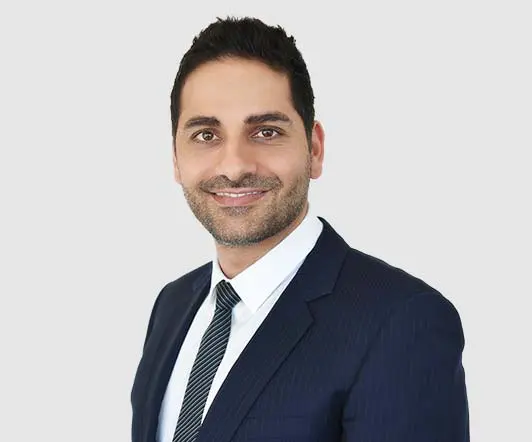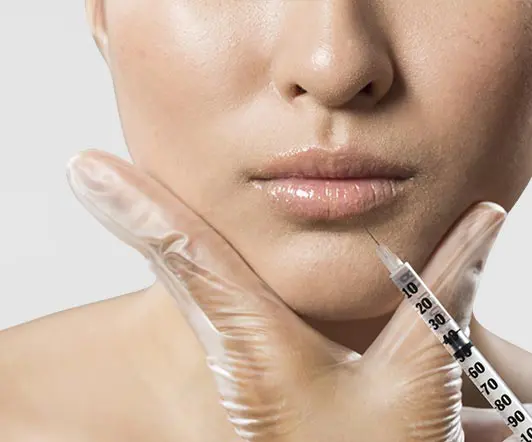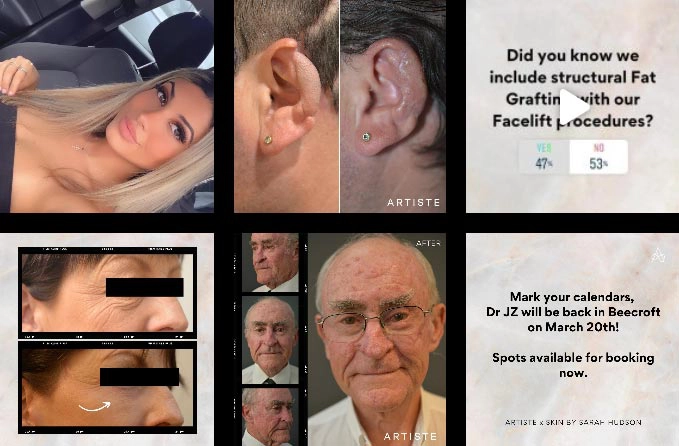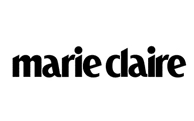Is Fat the New Vogue in Plastic Surgery?
Model featured in photography
Fat is the new vogue in plastic surgery but to be truthful fat grafting has been occurring since the 90’s. What is new is the understanding of how fat grafting works, the science of ‘take’, the preparation of fat and technology that aid fat transfer. Even during my training some 10 years ago fat transfer was treated like an after thought during surgery. Today fat grafting is an integral component of every operation where it has a place and is treated as such. Structural fat grafting refers to grafting of fat to maintain and re gain structure of the face, breast or body.
In Plastic Surgery skin grafting is the most common type of graft. A graft is a piece of tissue from one ‘germ cell layer’ that has no blood supply and obtains a blood supply in the area that is grafted. This definition is profound and applies to all types of grafts; skin, cartilage, bone and fat. When plastic surgeons harvest a skin graft this piece of skin has no blood supply as it is no longer connected to any tissue and it is reliant on the place it is grafted on. The recipient site must be clean and have a good blood supply ‘a vascular bed’ so to speak. This will ensure the skin graft which has no blood supply but consists of living cells regains a blood supply in the new grafted area.
When thinking of fat grafting it is the exact same thing. Back when Sydney Coleman made fat grafting popular in plastic surgery conferences fat was harvested from the body. The fat was just fat cells or adipocytes and transplanted to another part of the body with no blood supply. The recipient site was vascular and took the graft. Today fat grafting is thought to either survive as a graft or through the expansion of stem cells found in fat grafts. Now the way we harvest fat is through liposuction. That involves injection of a wetting solution and suctioning of fat from surplus areas in the body. The fat is not discarded but collected and prepared for fat grafting.
Some nomenclature
Fat grafting is simply the grafting of fat.
Fat transfer is the transfer of fat from one part of the body to another.
Structural fat grafting is the grafting of fat to restore structure to the face or body or breast. As distinct to grafting to fill a void or contour defect. Structural fat grafting aims to change shape whatever the reason.
Lipo filling is the filling up of something with fat cells.
Advances in Fat Grafting
As Sydney Coleman popularised the technique of fat grafting with liposuction and centrifuge a lot of scientific research has gone into the science of fat grafting. The science of fat ‘take’ can take up a whole other blog.
It is now well accepted that there are two theories to fat survival and the first is that the fat survives and takes much like a skin graft as described above. The second is that the fat cells are broken down leaving progenitor stem cells which then form new stable fat cells. While either one of these theories may be true, what is important to the plastic surgeon is the handling of fat and injecting of the fat. Good data show that we must handle the fat with utmost care either to not damage living fat cells or damage stem cells. So today we harvest fat through liposuction technique but with less pressure and in less traumatic fashion. We then treat the fat with either centrifuge or sieve or wetting technique to separate the true fat cells from blood and fluid. The fat is now ready to be injected as pure fat cells. This has advanced fat grafting over the last 10 years.
But there is another step that is really cutting edge now and that is to break the fat cells down to whatever size you want from larger particles to nano fat cells. This allows the specific injection of fine lines and the eyelids with nano fat and the jaw line or scars with micro fat grafts. Larger fat cells (marco fat) can be used to inject the breast or buttock.
Traditionally or even today surgeons that don’t pay much respect to fat grafting use a single harvesting liposuction cannula to harvest fat, for example a 5 mm diameter and this is the smallest size that the fat can be injected without damaging the cells. When transferring this size fat cell to a smaller injecting syringe you are damaging the fat cells, as the fat is being forced into a smaller caliber orifice. Surgeons aware of this would harvest fat with different size liposuction cannula’s to obtain the most appropriate size for injection. They would use a 2 mm, 3 mm or 4 mm cannula and 5-6 mm cannula for larger graft harvests. Today we can do this with more sophistication and precision. Today we can process this fat into a smaller size and have 3-4 different sizes of fat available for grafting. Using proprietary devices the fat is harvested in an atraumatic fashion and the fat after purification processing is cut with specific sharp blades to obtain certain sizes-nano or micro fat grafts. This allows the instant availability of custom fat cells of specific size to an area which is crucial to myself as a Facelift plastic surgeon.
The following is a list of sites for fat grafting and the ideal fat size based on my experience and training as a Plastic Surgeon.
Fat grafting can be used in the following scenarios:
Face: Cheek bones, jaw line, mid-face, temple: Micro Fat
Eyes: Lower eyelids, upper eyelids, tear troughs, brow: Nano Fat
Lips: Lips: Micro Fat
Scars: Contour defect: Micro and Macro fat
Breast -with an implant or on its own to augment the size of the breast: Macro Fat
Buttock-when injected into the buttock it is known as a Brazilian Buttock Lift, BBL: Macro Fat
Dr Jack Zoumaras is a Facelift Plastic Surgeon, Owner of Artiste Plastic Surgery and Current Honorary Secretary of the Australian Society of Plastic Surgeons.
Disclaimer: At Artiste Plastic Surgery, our Plastic Surgeons led by Dr Jack Zoumaras have been trained to the highest possible degree. All surgery has risks and it is always advised to get a second opinion. Risks are very real and we cannot guarantee any result. Results are illustrated as a guide only. All risks are managed and any need for revision surgery or complications (1-5%) can be managed by our specialist plastic surgeons.
Any statements on how you will feel is based on Level V Evidence:
Level V: How you will feel after plastic surgery varies between individuals, depending on psychological and physical factors. Our internal research is based on how patients in our practice feel after surgery.
The blogs are not a substitute for a medical consultation and do not form as part of the doctor to patient relationship.
SHARE THIS ARTICLE
Jul01
Facelift Recovery Tips: What Speeds Up Healing and What to Avoid
Disclaimer: At Artiste Plastic Surgery, our Plastic Surgeons led by Dr Jack Zoumaras have been trained to the highest possible degree. All surgery has risks and it is always advised ...
Jul01
How to Prepare for Facelift Surgery: What to Do Before Your Big Day
Disclaimer: At Artiste Plastic Surgery, our Plastic Surgeons led by Dr Jack Zoumaras have been trained to the highest possible degree. All surgery has risks and it is always advised ...
ABOUT ARTISTE
Artiste Plastic Surgery is an Award Winning Specialist Plastic Surgery practice led by internationally trained Dr. Jack Zoumaras, Plastic Surgeon and Peer Reviewed Face Surgeon
Artiste offers the latest Cosmetic Surgical Procedures of the Face, Breast and Body, inspired from leading centres around the world.
STAY IN THE LOOP
Enter your email address below to receive updates on new articles and VIP access to promotions and special offers.
FOLLOW US ON INSTAGRAM












